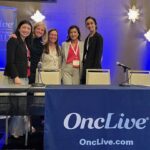Introduction:
Lung cancer remains one of the most challenging and life-threatening diseases; however, several exciting treatment advances show promising benefits. A recent study in which Virginia Cancer Specialists participated under the research leadership of Dr. Alex Spira, the AEGEAN trial, was published in the New England Journal of Medicine (NEJM) earlier this month and has shed light on a potential breakthrough in the treatment of resectable non–small-cell lung cancer (NSCLC). This study explores the use of perioperative immunotherapy to improve outcomes for patients with this type of lung cancer.
Background:
Several recent clinical trials incorporating neoadjuvant (pre-operative) and adjuvant (post-operative) immunotherapy have shown promise in improving long-term outcomes for patients with NSCLC (New Advances in Early-Stage Lung Cancer Treatment – Samantha DiBenedetto, MD). In particular, the AEGEAN trial aimed to investigate whether a combination of both approaches, termed perioperative treatment, could offer even better long-term outcomes for patients with resectable NSCLC.
The Study:
Researchers randomly assigned 802 patients with resectable stage II-IIIB NSCLC in a 1:1 fashion to receive platinum-based chemotherapy combined with durvalumab (an immunotherapy drug) or a placebo for 4 cycles prior to surgery. Following surgery, patients received post-operative durvalumab or a placebo intravenously for 12 cycles. The primary outcomes of the study were event-free survival and pathological complete response.
Results:
The first interim analysis showed a significant improvement in event-free survival for patients receiving peri-operative durvalumab compared to placebo, resulting in a 32% reduction in the risk of disease progression, recurrence, or death with durvalumab. At 12 months, the event-free survival for patients who received durvalumab was 73.4%, compared to 64.5% for those who received a placebo. Additionally, pathological complete response, an important measure of the effectiveness of pre-operative treatment, was significantly higher in the durvalumab group (17.2% vs. 4.3%).
Perhaps most importantly, these benefits were observed regardless of the disease stage and programmed death ligand 1 (PD-L1) expression. All patients of varying stages and PD-L1 expression derived significant improvement in event-free survival and pathological complete response. Overall, the treatment was well-tolerated with similar rates of severe side effects between the two groups.
Conclusion:
The findings of this study are indeed very promising and offer new hope for patients with resectable NSCLC. The combination of perioperative durvalumab with neoadjuvant chemotherapy has demonstrated significantly improved event-free survival and pathological complete response rates compared to neoadjuvant chemotherapy alone, all while maintaining a safe and manageable side effect profile. This research is practice-changing in the way we approach lung cancer treatment; by offering more effective treatment options for patients upfront, we are able to improve long-term outcomes. The results of this study represent a significant step forward in the fight against lung cancer; however, further research and clinical trials remain of utmost importance to continue to improve treatments and outcomes for all patients affected by this devastating disease.










